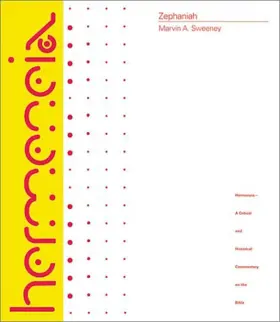

Collections
This book appears in the following featured collections.
- Ultimate Commentary Collection: OT Technical by John Glynn
- Favorite Advanced OT Commentaries by Jeremy Pierce (parableman)
- Commentaries by Jewish Scholars by Matt Quintana
Reviews
offers a detailed text-critical and exegetical study in the Hermeneia series
tradition
An excellent resource for those interested in the historical background. For those coming at the text from a Christian perspective, this commentary also includes snippets on how some of the early church fathers understood different passages in the book.
Meticulous commentary, characterized by an interest in form critical issues and an effort to identify the historical background.
[Full Review]
Abilene Christian University Abilene, TX 79699 The oracles of Zephaniah, like those of other Israelite prophets, capture the raw beauty of articulating, during a time of political strife and social disruption, a faith in a nobler future. Marvin Sweeney, one of today�s most perspicuous and astute commentators on the biblical prophetic corpus, offers here an analysis of Zephaniah that well represents both the details and overall artistry of the work. Dating most of the book to the end of the seventh century B.C.E. (as per 1:1), and thus probably to the career of the historical Zephaniah, Sweeney finds possible later expansions only in 1:3, 4 and 3:20. While many scholars assign at least 3:14�20 to a postexilic redactor, Sweeney argues plausibly for dating even that pericope to the heady years of Josiah�s reform, when the return of deportees throughout the Assyrian Empire seemed an exciting possibility (196). He does recognize, however, that the superscription in 1:1 comes from an archivist or teacher who wished to present Zephaniah�s parenesis for his own purposes (9). Thus it is possible to contemplate a post-Josianic reinterpretation of the work. Typically for the Hermeneia series, this volume begins with an extensive introduction to the literary history of the book (1�41). Somewhat innovative ly, this introduction treats the MT, LXX, scrolls from the Judean desert, Targum Zephaniah (part of Targum Jonathan to the Prophets), the Peshitta, and the Vulgate as distinct literary works, not merely as resources for reconstructing a putative �original� text.
[Full Review]




